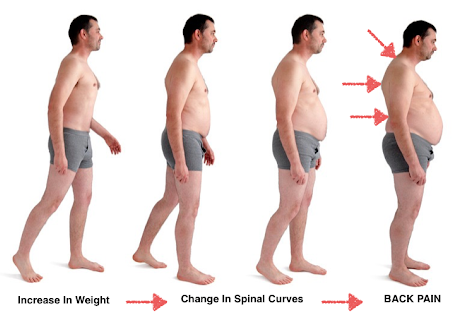The Link Between Weight and Back Pain
We often talk about obesity and weight loss in relation to diabetes and heart disease. But did you know, that losing weight can help resolve or prevent back pain. If you suffer from back pain, you know how frustrating and limiting it can be. What you may not know is that there is a link between back pain and your weight.
Excess weight and obesity are linked to high blood pressure, type 2 diabetes, heart disease, and stroke. It is no surprise that it also increases the risk for back pain, joint pain, and muscle strain. The lower back is particularly vulnerable to weight-related pressure.

Every extra pound in the belly = 7-10 pounds on the spine
Maintaining a healthy weight or losing weight can help ease or prevent back issues and reduces stress on other joints as well. Dropping just a few pounds can make a big difference to your back.
If you are heavier than your ideal weight, your muscles will need to work harder to perform everyday tasks. By losing weight, you are reducing the strain on your back, including the muscles, ligaments and discs.
How Much Do You Need to Lose to Get Relief?

How thin is thin enough to get back pain relief?
I recommend staying within 10 pounds of your ideal weight to keep your back healthy and pain-free.
The good news is that physical activity also helps manage back pain. In fact, exercise may be your best bet for preventing and managing chronic low back pain.
Exercise Programs for Weight Loss and Back Pain

Aerobic Activity and Back Pain
A key ingredient in nearly every type of weight loss program, aerobic activity is any motion that uses the large muscles of the body and is maintained continuously for at least 30 minutes.
Walking, and in particular, cycling, swimming, and aquatic exercise are good low and moderate impact activity choices.
Thirty minutes of aerobic activity performed five days per week is the amount generally recommended by experts for realizing health benefits
Strength, Flexibility and Back Pain
It’s well-known that strengthening and stretching trunk muscles (especially the abdominals) and muscles around the hips provides support for upright body posture and for the spine itself.
Regular practice of yoga, Pilates or other mind-body workouts can help you do just that.
Singh Snapshot

Weight gain can lead to lower back pain by compressing the lumbar spine in the lower back, which often results in a pinched nerve that leads to pain and other symptoms. People who are overweight and currently experiencing lower back pain may find that weight loss achieved by exercising regularly and healthy eating habits, may relieve some of the lower back pain.
Exercising improperly or too vigorously may irritate the pinched nerve in the lower back, causing the lower back pain you are experiencing to increase.
REMEMBER: For every pound you lose of belly fat, your back will feel 7-10 pounds lighter!



Leave a Reply